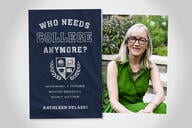You have /5 articles left.
Sign up for a free account or log in.
Over the three years that Kristen Glass Perez has been one of two campus chaplains at Augustana College, there's been a notable dip in the number of students walking through the doors of the college's Ascension Chapel. It's been going that way for a while now, the college said, as students at the Lutheran institution have become less interested in organized religion. Just 13 percent of this year's freshman class are Lutheran and many don't worry about attending services.
But students did continue to come to Perez for advice, and one topic seemed to be on their minds the most: What am I supposed to do with my life?
This year, Perez moved out of the chapel and into the college's Career, Opportunities, Research, and Exploration Center. She is now the "director of vocational exploration," and her goal isn't to just help students find a job or internship. She's trying to help students find their calling.
"The career process involves finding what you're good at, what do you like doing," Perez said. "Your calling is who you are or want to be in your work, your home, your local community, your faith community if you have one. When you match your unique skills with the needs of those various areas of your life, you arrive at your vocation. It's an ongoing process, not a place where you immediately have it all figured out. The center's not just a place to go and get the answers. It's a place that encourages you to ask the questions."
Last year, the center comprised just four staff members. Perez is now one of a 13-person staff, with some focused on more traditional career services like helping students find internships.The increase is part of a larger strategic plan, called Augustana 2020: Enhancing Student Success, Before and After Graduation, that the college began implementing when it "became clear that too many graduates were wandering in finding their profession and calling," Steve Bahls, Augustana's president, said.
In many ways, Perez's transition is a sign of the times. Colleges have always had career counseling of some kind, but as institutions have faced increasing pressure to prove they are worth a student's investment, the importance of career centers has grown, as have the amount of resources devoted to them.
"There's a lot more pressure now on universities to demonstrate positive outcomes," said Andy Chan, vice president for personal and career development at Wake Forest University. "How are the students doing in respect to getting jobs or going to graduate school? I think for a long time schools have not really spent too much resources in that area, and now there's this sense that we need to make up for that."
Bahls, Augustana's president, said he could have used more help in finding the right career when he was in college. As a junior in high school, he dreamed of one day being an associate at a "big law firm." And he achieved that dream, he said, but he quickly learned that he had spent years dreaming of the wrong profession.
"I found myself in a large Milwaukee law firm," Bahls said. "I got the golden ring, but I wasn't happy. Thankfully, that led to a second career in higher education. I eventually found that satisfaction. Within the Lutheran tradition, we ask ourselves who we are and what good can we do. So at Augustana, we urge our students to ask who they are before we ask what they want to do."
Perez said she found her calling a little earlier in life, deciding she would become a chaplain while working at a summer camp in her early twenties. She has held several jobs over the years, but the work has always focused on young adults. From youth ministry to working as the director of young adult ministry at a denominational headquarters in Chicago to her new role at Augustana as director of vocational exploration, Perez said she has been "in a privileged position to watch people as they transition into adults."
"I don't dread that; I celebrate that," she said. "I love being on those journeys with them."
Perez, who still devotes about 20 percent of her work week to more traditional pastoring, said sometimes students' journeys involve religious exploration, but most often the conversations are more general. What are a student's interests and passions? What type of person does he or she want to be? What type of person is she or he now? Perez said she starts with those "10,000-foot" questions, and then works with students -- usually about 10 to 15 a week -- to connect the answers to more concrete career plans.
While the process may be a little more philosophical, and even spiritual, than most career counseling, Chan said he'd like to see a similar focus at more colleges.
"I think a lot of times, we get so focused on outcomes -- do students have a job, do they go to grad school -- that all the energy is focused just on what a student might be skilled at," he said. "And sometimes that might take a student down a path that's not the right fit for them as a person."




